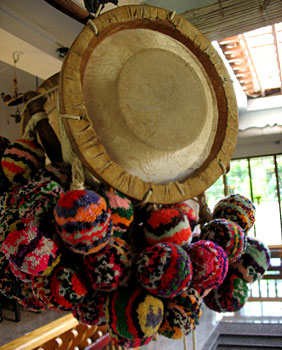 Idakka is a percussion instrument from the state of Kerala. Though this hour-glass shaped instrument appears simple, its construction is quite complicated. The body is of wood and waisted length of the body is 25 cm and the diameter of leather faces about 12 cm. Each membrane is fixed to a ring of metal and the two rings are connected by thick cotton threads. Now, the parchments are not permanently and immovably attached to the body. On the other hand they are only held fairly tense against the mouth of the body of the drum, by tightening the rope braces. Further the strap by which the Idakka is suspended from the shoulder of the musician is also passed round the braces at the waist of the instrument. The contrivance for changing the tightness of vellum has been carried to a high degree of finesse.
Idakka is a percussion instrument from the state of Kerala. Though this hour-glass shaped instrument appears simple, its construction is quite complicated. The body is of wood and waisted length of the body is 25 cm and the diameter of leather faces about 12 cm. Each membrane is fixed to a ring of metal and the two rings are connected by thick cotton threads. Now, the parchments are not permanently and immovably attached to the body. On the other hand they are only held fairly tense against the mouth of the body of the drum, by tightening the rope braces. Further the strap by which the Idakka is suspended from the shoulder of the musician is also passed round the braces at the waist of the instrument. The contrivance for changing the tightness of vellum has been carried to a high degree of finesse.
The Idakka is played by striking it with a stick. For this reason, it is believed that that this instrument is quite difficult to master as it is played with a single stick and not two sticks as in the case of some other drums. The player holds the wooden body at its middle, passing his hand in between the ropes and beats on one face. While striking the Idakka, he slightly moves it up and down and this action exerts differing pulls on the shoulder strap and hence on the chord round the braces. He also applies varying tensions on the chord itself. Besides, since the leather faces are not fixed to the body, he can move it a little almost imperceptibly. All these produce highly controlled changes in pitch and intensity making the Idakka almost a melodic drum.
The instrument is held to be a Devadyam (divine instrument), and as a matter of custom it is played during Puja in the temples. It is also played as the accompaniment music to the Sopanam music just outside the Sanctum Sanctorum. The two faces of the Idakka are said to represent the sun and moon (Suryan and Chandran). The Idakka is also used in the dance Kathakali, a dance performance from the state of Kerala. It is played when a female character is performing on the stage. Apart from the Kathakali, it is also used in other dance forms such as the Mohiniattam and Krishnattam. It is even used in the traditional concert called the Tayambaka. The Idakka is one of the five instruments that comprise the Pancha Vadya ensemble of Kerala.




















